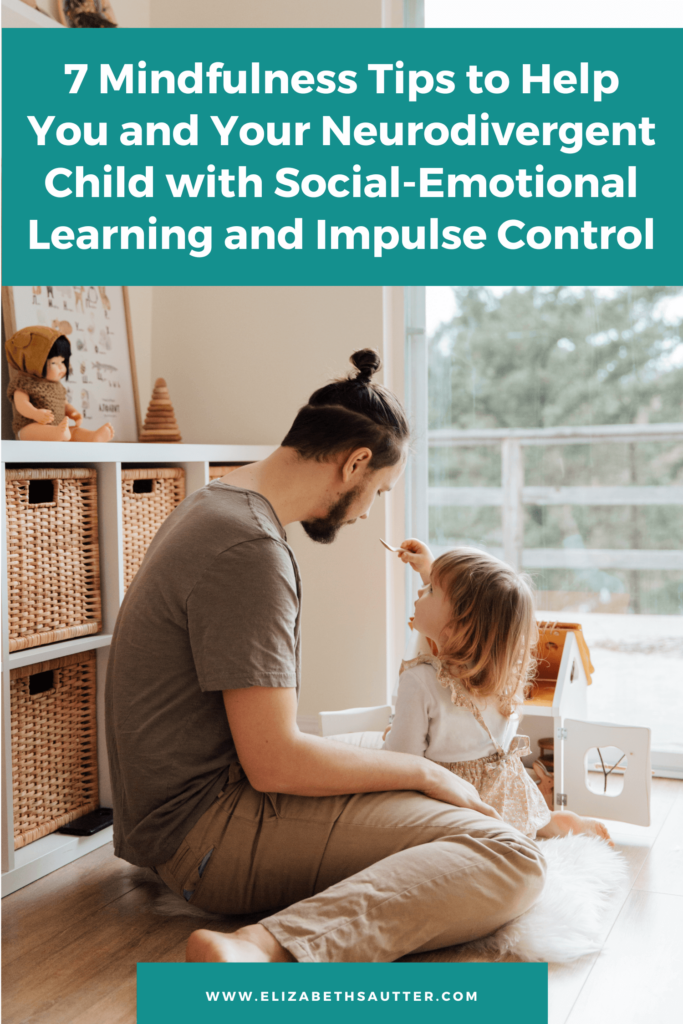Want to foster emotional regulation, sensory awareness, and relationships through mindfulness practices in your parenting? If so, keep reading…
Picture this: You thought you made the best casserole for your child, but your heart sank when they spat out the first bite. Or maybe you noticed your sister cringe when her daughter told her your mom she looked fat in her new dress.
These impulsive actions can trigger a range of emotions in parents, even when we know our children didn’t mean to be insensitive. So, how can we transform these moments into win-win situations for all?
The answer lies in one powerful tool: MINDFULNESS.
Staying in the present moment strengthens our ability to pause before we react so that we can assess the situation, the people around us, and most importantly, our own feelings.
The Power of Mindfulness in Promoting SEL and Impulse Control:
Amidst the challenges of parenting neurodivergent children and addressing behavioral impulses, mindfulness emerges as a transformative practice. By cultivating mindfulness, parents and children can develop essential social-emotional learning (SEL) skills, enhance emotional regulation, heighten self-awareness, and build stronger relationships. It offers a path toward a win-win environment for the entire family.
Understanding Impulse Control and Mindfulness:
Impulse control is a skill rooted in the prefrontal cortex, the higher-level learning brain. Unlike other parts of the brain, the prefrontal cortex develops over time, reaching full maturity between the mid to late twenties. Mindfulness empowers individuals to pause and assess their surroundings, emotions, and personal experiences. By doing so, it strengthens the ability to remain in control of impulses, fostering deeper connections with oneself and others.
Building Mindfulness into Daily Activities:
Supporting your child’s impulse control and behavioral challenges requires regular mindfulness practice, seamlessly woven into daily activities.

Here are seven ways for parents and children to engage in mindfulness together:
- Mindful Toothbrushing: While brushing your teeth together, encourage your child to be fully present while brushing their teeth, savoring the sensations, tastes, and smells involved.
- Mindful Eating: Embrace mindful eating as a family, savoring each bite while noticing the taste, textures, smells, etc.
- Gratitude Practices: Integrate gratitude rituals into your daily routine, encouraging your child to identify and share three things they are grateful for each day.
- Body Scans: Guide your child through a body scan meditation, enabling them to become aware of physical sensations and areas of tension in their body.
- Mindful Listening: Practice active listening together, focusing on specific sounds in your environment or music, and engaging in discussions about what you both notice. This cultivates presence and strengthens listening skills.
- Mindful Walking: Embark on mindful walks, paying attention to the sensations in your feet as they touch the ground and appreciating the beauty of your natural surroundings.
- Breathing Exercises: Teach your child simple breathing exercises, emphasizing slow, deep belly breaths to promote calmness and self-regulation. Lay down and put a book on your belly or just hand over the tummy to feel and watch it slowly go up and down.
Infuse mindfulness, emotional regulation, and positive connection into your daily activities to reduce anxiety and challenging behaviors by exploring The Connected Family Journal and the Positive Patterns Family Coloring Book for further guidance and resources on nurturing SEL skills and strengthening relationships. Visit https://www.elizabethsautter.com/journal-coloring to embark on a mindful journey with your family.
Remember, simplicity is key to making mindfulness practices stick. By incorporating these tips into your parenting approach, you can create a nurturing environment that supports SEL, emotional regulation, and meaningful connections with your neurodivergent child. Start practicing mindfulness today and witness the positive transformations within your family.
“Staying in the present moment strengthens our ability to pause before we react so that we can assess the situation, the people around us, and most importantly, our own feelings.”
— Elizabeth
